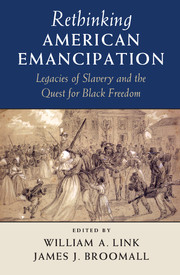Book contents
- Frontmatter
- Contents
- List of figures
- Notes on the Editors and Contributors
- Acknowledgments
- Introduction
- I CLAIMING EMANCIPATION
- II CONTESTING EMANCIPATION
- 4 “One Pillar of the Social Fabric May Still Stand Firm”: Border South Marriages in the Emancipation Era
- 5 Axes of Empire: Race, Region, and the “Greater Reconstruction” of Federal Authority after Emancipation
- 6 Fear of Reenslavement: Black Political Mobilization in Response to the Waning of Reconstruction
- III REMEMBERING EMANCIPATION
- Index
6 - Fear of Reenslavement: Black Political Mobilization in Response to the Waning of Reconstruction
from II - CONTESTING EMANCIPATION
Published online by Cambridge University Press: 05 November 2015
- Frontmatter
- Contents
- List of figures
- Notes on the Editors and Contributors
- Acknowledgments
- Introduction
- I CLAIMING EMANCIPATION
- II CONTESTING EMANCIPATION
- 4 “One Pillar of the Social Fabric May Still Stand Firm”: Border South Marriages in the Emancipation Era
- 5 Axes of Empire: Race, Region, and the “Greater Reconstruction” of Federal Authority after Emancipation
- 6 Fear of Reenslavement: Black Political Mobilization in Response to the Waning of Reconstruction
- III REMEMBERING EMANCIPATION
- Index
Summary
In the midst of one of the most demoralizing electoral seasons in African American history, as white-line militias attacked black Republicans across the Deep South, and as the Democratic Party won numerous elections through fraud and intimidation, local black residents in Concordia Parish, Louisiana, grew increasingly apprehensive. At first glance, there seemed to be little to worry about in 1876. The parish was solidly Republican, as it had been since black enfranchisement nine years before. It was home to over thirteen thousand black people but only thirteen hundred white people, and black Republicans held nearly every local political position. But even if Concordia Parish seemed relatively stable, the growing white supremacist insurgency in the surrounding parishes and counties could not be ignored. At campaign rallies, Republican speakers mentioned the merits of their party, but they also denounced, with unusual vehemence, the competing ticket. A victory for the Democrats, they warned, would not merely lead to a change in governance; it would mean, recalled Daniel Tucker, a fifty-six-year-old ex-slave farmer, that black people “would be put back into slavery.” On Election Day at one poll, freedpeople carried posters with images of black people being chased by white men with dogs, which was meant to indicate, according to a white planter who witnessed the scene, how “[white] southern people would treat the negro should the democratic party [sic] get into power.”
The possibility of reenslavement was rarely expressed openly in the Reconstruction era. African Americans were more likely to talk about, at least publicly, the progress that had been made since the abolition of slavery, as well as the present struggles to attain a fuller measure of freedom. As William A. Link and Paul Ortiz explain in this volume, African Americans championed full citizenship in the United States as well as the extension of emancipation and democracy to the Caribbean and around the world. Yet as Gregory P. Downs and Carole Emberton point out, freedom was often dependent on proximity to federal power and subject to the vagaries of an emerging imperial state. This disconnect between claims of freedom and enforcement was one that ordinary African Americans knew all too well.
In Concordia Parish, talk of reenslavement had not surfaced among freedpeople in prior elections, and white Democrats never publicly advocated the reintroduction of slavery.
- Type
- Chapter
- Information
- Rethinking American EmancipationLegacies of Slavery and the Quest for Black Freedom, pp. 146 - 164Publisher: Cambridge University PressPrint publication year: 2015



